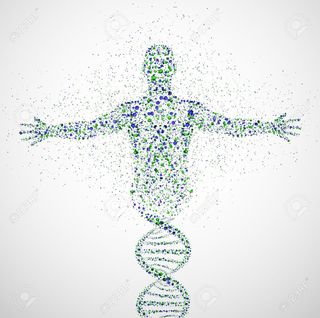Environment
Biology Determines Every Thought, Feeling, and Behavior
Why the contribution of biology to human behavior is always 100%.
Posted October 20, 2016 Reviewed by Ekua Hagan

"Is that human characteristic biologically or environmentally determined?"
How many times have you heard that question or its equivalent (e.g., "Is it genetic or learned?" "Is it caused by nature or nurture?" etc.)?
If you read about psychological topics, which I would guess is likely because you are reading this, I would further guess that you've heard this question literally hundreds of times.
I would also guess that you are familiar with the "correct" answer, which experts invariably say is "both." Yes, interview most psychologists or read any psychology textbook and you will find that our thoughts, feelings, and behavior are the result of an interaction between biological factors and environmental (or cultural) factors.
However, you will also find that psychologists often like to apportion credit to biology and environment to varying degrees. "Yes," they will say, "It is always a combination of biology and environment, but sometimes biology is more important. Or sometimes the environment is more important. They will sometimes be more specific, saying things like "Genetic differences account for 70% of the differences in IQ scores." Or, "environmental factors account for 80% of the differences in personality traits associated with secure attachment."
So, even though most psychologists accept the idea that we are the product of the interaction between biology and environment, in some cases they will argue that biology is more important than environment or that environment is more important than biology. In fact, if one allows this line of reasoning, in theory we might find some behavior for which the contribution of either biology or environment approaches 100% and the other, 0%.
What I want to argue in this post is that environment is never, ever more important than biology, that biology is 100% involved in all the variance in what we think, what we feel, and how we behave. After I attempt to demonstrate this, I will then attempt to deconstruct what people really mean when they say that biology or environment is more important.
As I argue for the position that everything we think, feel, and do is determined 100% by biology, I am not saying that environmental factors contribute 0%. For balance in this post, I might spend equal time talking about the importance of the environment. I will say a thing or two about environmental influences, but I want to focus on biology because when I see an argument that denies the importance of biology or environment, it is virtually always an argument against biology. For example, in the area of gender differences, I have seen plenty of cases where someone has argued at length that "biology has nothing to do with this," but have never seen a case where a person has argued "the environment has nothing to do with this."
To see why I say that biology contributes 100%, to any psychological phenomena, let us look at my favorite example of a phenomenon where environmental factors are said to play a crucial role: the impact of caretaking behaviors on the development of attachment-related traits.
Research indicates that children whose caretakers express warmth and are predictably responsive tend to form a secure attachment marked by a long list of positive traits. They have high levels of self-esteem, confidence, trust, emotional stability, impulse-control, and resiliency. They tend to be free from anxiety. They are empathic and compassionate. They form friendships easily in childhood and intimate relationships as adults.
In contrast, children whose caretakers are cold, rejecting, inconsistent in their responsiveness, and/or abusive tend to suffer from a number of emotional and social problems. They can be fearful, suspicious, withdrawn, impulsive, clingy, and/or aggressive, depending on the specific detrimental parenting behaviors they experienced. They tend to have problems forming and maintaining healthy friendships and intimate relationships later in life.
Now, with such clear, consistent evidence that an environmental factor (parenting behavior) has a reliable impact on children's emotional and social well-being, how can I say that biology contributed 100% to these outcomes?
Humor me for a moment while I respond with what might seem an absurd answer. Instead of caring for children, let's think about what might happen if a number of different adults were taking care of rocks. Yes, rocks. Let's say that some of the adults treated their rocks with warmth and consistent, caring behavior. They spoke gently to their rocks, patting them often, pouring warm water on them when they seemed to be getting dry, and often checking on them throughout the day and evening. Other adults ignored their rocks, yelled at them, slapped them occasionally, or alternated inconsistently between being nice or mean to their rocks. Would we expect any differences in how the rocks turned out as a function of their caretakers' behaviors? I would bet the farm against it. Why? For starters, rocks are not biological beings.
Let's repeat this thought experiment, this time substituting plants for children. Would plants with nice caretakers turn out differently from plants with mean caretakers? If mean caretaking included inconsistent watering and locking the plant in a dark closet, then yes, definitely. Plants are life forms with specific biological needs. There is also some evidence that human noise and touch affect plant growth.
Before we get carried away and attribute human qualities to plants, let us keep in mind that the outcomes of human behaviors on plants depends upon the specific biology of the plant. The way you treat a plant will probably not make it fearful, clingy, or aggressive, because those traits are not in a plant's biological repertoire. But you can certainly stunt a plant's growth, affect the color of its leaves, or even kill it with your behavior.
Let's repeat the experiment with iguanas. Or snakes or toads. Choose your favorite pet reptile or amphibian. Would kind or cruel treatment of these pets affect their emotional and social traits? I am uncomfortable betting either way on this one. These animals do have a nervous system that is more similar than a plant's nervous system is to ours. Reptiles have emotionality and social behavior that is more similar to ours than the reported emotionality and sociality of plants. Still, I am not sure how much our treatment of a snake would affect its behavior.
Now, let's repeat this experiment with kittens. Or baby monkeys. Might we see developmental outcomes that resemble the attachment outcomes for human children? I can comfortably bet the farm that the answer is yes. And I would do this even if I was unaware of supporting evidence from Harry Harlow's experiments on baby rhesus monkeys. Why? Because both kittens and monkeys are mammals, just like us. And monkeys are primates, making their brains even more similar to ours.
The capacity for certain behaviors and the tendencies for those behaviors to be shaped by specific environmental events are completely determined by a biological organ: the brain. Caretaking behavior as a set of environmental events can have a profound effect on a being's emotional and social life only because of that being's brain (and related biological systems within the body). Biology is all-important.
Obviously, caretaking effects on development will differ for rocks, plants, reptiles, non-human mammals, and humans will differ because the biological characteristics of these groups differ. And attachment research shows that even for human children the effect of caretaking depends upon the biological temperament of the child. Some children are so temperamentally resilient that poor parenting causes little adverse effect. Some children are so temperamentally sensitive that they grow up to become highly sensitive individuals even with the most benign parenting. Biology matters completely in every single case.
Before I continue, let me provide my short acknowledgment that environments are vital to normal biological development. (Remember, this acknowledgment is short because virtually nobody denies this). Light matters to plants and kittens. You cannot expect normal development if you raise a plant or kitten in a dark closet. What would otherwise have been a normal, green plant will look like a white, spindly ghost-of-a-plant. Kittens raised in the dark would become permanently blind. Experimenters have been more selective in the second case, demonstrating that kittens raised wearing goggles with vertical stripes become blind to horizontal surfaces, while those wearing goggles with horizontal stripes become blind to vertical edges. When this selective exposure to light occurs during a critical period of brain development, the effect is permanent. Cats exposed only to vertical light cannot jump up properly on horizontal surfaces while cats exposed only to horizontal light will bump into vertical poles that they cannot see. Why? Portions of the nervous system responsible for the perception of orientation atrophy permanently. So, yes, biological systems absolutely require certain environmental inputs for normal development. In social animals, appropriate caretaking is one of those vital inputs. Case closed.
Oddly, I have often seen the above example of light-deprived kittens as an argument that vision is "learned" (environmental) rather than "innate" (biological). So what, exactly, is occurring when kittens learn to perceive horizontal and vertical orientations? Normally, interactions with different arrays of light cause changes in the brain, which allow the veridical perception of horizontal and vertical. If you provide abnormal light input, the changes in the brain are abnormal—complete or partial blindness. This point is not just limited to visual perception, however. All learning, every single act of learning from environmental input, occurs only when there are changes in the biological nervous system. Biology matters completely in every single case of learning.
If there can be no environmental influences without specific biological changes within an organism, then it makes no sense to say that certain thoughts, feelings, and behaviors are due to the environment (whether physical, social, or cultural) rather than biology. So perhaps people who deny that biology plays a role in certain psychological phenomena are not really denying that the brain is always involved. Maybe they are actually arguing about something else. Before I speculate on what that might be, we need a quick aside about behavioral genetics.
Sadly (and I think unintentionally), behavioral genetics has contributed to the mistaken notion that the contribution of biological and environmental influences on psychology can be apportioned into percentages. A mainstay concept of behavioral genetics is the construct of heritability. Heritability can be defined as the proportion of variance in some observable characteristic (e.g., assessed shyness) that can be statistically accounted for by genetic variability. Early studies in behavioral genetics compared the similarity of identical twins for a particular trait to the similarity of fraternal twins. The degree to which identical twins are more similar than fraternal twins indicates the proportion of overall differences in the trait that can be explained statistically by similarity and differences in genes. An early way to quantify heritability, Falconer's formula, doubled the difference between the correlation of trait scores for identical twins and the correlation of trait scores for fraternal twins. So if identical twins' shyness scores correlated .80, and fraternal twins, .60, heritability = 2 * (.80-.60) = .40. The interpretation is that 40% of overall variability in shyness can be statistically explained by genetic differences.
Over the years, many other formulas and kinds of samples (e.g., biological vs. adopted children) were developed to estimate heritability. Approaches became more sophisticated, attempting to include gene-gene interactions, dominance-recessive relationships, and gene-environment interactions. Researchers came to realize that heritability estimates varied somewhat across samples, depending on the genetic and environmental variability within the sample. Yet a consistent finding was that virtually every measured trait showed at least some heritability. Heritability estimates for personality traits usually range from .40 to .50. This should not be surprising, given that any environmental effects will depend on the structure of that all-important biological organ, the brain, and that differences in brain structure depend partially on differences in genes. Always.
It would have been shocking to learn that differences in genes had nothing to do with differences in psychological characteristics. So I guess it is a relief that behavioral genetics confirms what seems to be a necessary truth. However, there are at least two negative consequences of behavioral genetics. One is that (at least until very recently), behavioral genetics studies told us absolutely nothing about which genes were involved in observed differences (and therefore how genes were impacting the traits under study) or about what part of the environment (and the environment is a pretty huge thing) affected the traits under study (and therefore how they were having their effect). Typically, environmental effects ("environmentability") were estimated by subtracting heritability from 1.00. So if the heritability of shyness is estimated at 40%, then environmental effects must be 60%. But unlike the kitten studies, where we can see specific brain areas deteriorating from lack of light, 60% environmentability gives us absolutely no clue about which part of the environment might be contributing to shyness or how any environment might even be capable of influencing shyness, because environments are not even measured in the classic behavioral genetics study. (At least we know that genes affect traits by producing proteins, even if we do not know which genes are involved. But we haven't an inkling how, say, social expectations cause personality differences.) More recent research has attempted to identify specific genes and environments that account for their findings, but, sadly, the original heritability approach has led to the second negative consequence: perpetuating the mistaken notion that the involvement of biology can be less than 100% for any thought, feeling, or behavior. Despite explicit warnings from behavioral geneticists that "A heritability of .40 . . . does NOT mean that 40% of any person's shyness is due to his/her genes and the other 60% is due to his/her environment," the mere attributing percentages of variance into genetic and environmental influences unintentionally misleads non-geneticists into making precisely that mistake.
The final question I want to address is what people might be thinking when they deny that biology always plays a role in certain psychological phenomena. I admit that these concluding thoughts are speculative, but they might be amenable to study.
One possibility is that biology deniers are philosophical, mind-body dualists who believe that mental events such as perceptions, emotions, beliefs, and desires can operate independently of the workings of the physical brain. That position is logically consistent with the idea that biology is not always involved in psychological phenomena. In fact, it is consistent with the idea that biology never determines our psyche because it is an independent ghost in the biological machine. Of course this position cannot easily explain how a nonmaterial ghost can influence the physical body, so most scientists reject such a dualism. I certainly do. If this is the reason for denying biology, we would have to get into philosophical arguments about dualism versus materialistic monism. But I have a suspicion that philosophy of mind does not underlie the denial of biology.
The actual dismissal of biology, I hypothesize, is often motivated by misguided fears about what "biological determinism" might imply. In my readings of biology deniers, I often see the concept of "biological influence" mistakenly equated with permanence and immutability. In fact, biology deniers have coined the expression "biological essentialism" to suggest that to think about a person's characteristics in terms of biology is to claim that these characteristics are an essential, natural, and unchangeable property of that person. Biological essentialism is a worrisome concept if you are not happy about the biologically determined characteristic (whether in yourself or others) and you want that characteristic to change. For example, the notion that aggressiveness in human males is a biologically-based trait, not subject to change, might lead to the disturbing conclusion that men will always be raping women and waging war. Or, if depression is a biologically based trait, not subject to change, then I have no hope about getting over my depression.
I think that flaw in this line of reasoning is obvious, but it is apparently not obvious to everyone because it seems that this is what is going on in the heads of some biology deniers. The first mistake is to say something is so because I want it to be so. Let's say that aggression is in fact a trait that is influenced by the biological substance testosterone. Would my fear that men will never stop raping and waging war mean that testosterone has nothing to do with aggression, that aggression is simply a "social construct" that can be renegotiated? No, my mere wish for behavior to be uninfluenced by hormones or any biological events does not prevent the hormonal and nervous systems from operating the way they do. Wanting something to be a certain way does not make it so.
But an equally serious mistake is to equate biology with immutability. The fact is that biological systems are constantly in states of flux and change. Some of these changes are very slow, occurring over the lifespan. For example, extraversion, neuroticism, and openness to experience tend to decrease over the lifespan, while agreeableness and conscientiousness tend to increase. Some changes occur daily, some across the seasons of the year. Some changes are regular and predictable, others, less so. Biology does not imply lack of change. Just the opposite.
So here I would end with a suggestion. If you really do want to effect positive changes in your life and in society as a whole (and who doesn't?), I would recommend that we work to understand exactly how genes and environmental events affect our ever-changing brains and relevant biological systems. The key to a better world is an accurate understanding of biology, not a denial of it.




